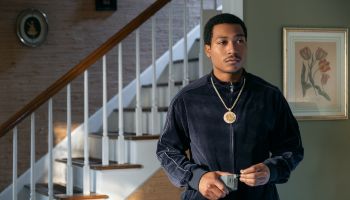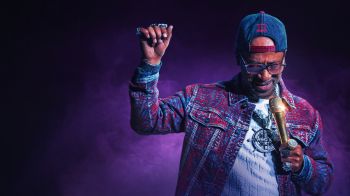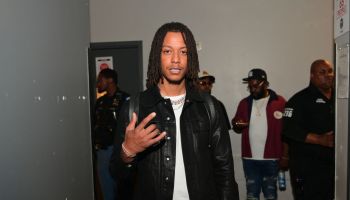Rainbow PUSH Detroit Chapter/State Coordinator, Pastor D. Alexander Bullock of Greater St. Matthew Baptist Church is taking on the fight against voter suppression through “voter education and activation.”
VIDEO: He’s Innocent & Not A Racist! Zimmerman’s Mother Defends Her Son
Bullock spoke exclusively to GlobalGrind about the significance of this year’s election for the nation and his hometown Detroit, where only 10 percent of registered voters in the African American population turned out to vote in 2010 and a little over 10 percent participated in the 2008 presidential election.
Bullock, who is also the president of the Highland Park NAACP, detailed the issues that minority communities in Detroit are currently facing and his plan of action to make sure his community is heard in the 2012 election.
Check out our exclusive sit down with Bullock below!
GlobalGrind: What is the message that you are pushing concerning the upcoming election?
Alexander Bullock: Our message is very simple and it is essentially, vote early and be engaged and educated when you vote. We are responding to what we believe is a national movement to suppress the minority vote, the vote of seniors and the vote of students…We have also been working with folks in Pennsylvania and we’ve been engaged in Alabama, as well as South Carolina and other states, where we are seeing this legislation being put in place that really, really puts a hindrance on voting – where people have to get new IDs or certain early voting provisions are taken off the books, or people have to buy a birth certificate. So seniors, for instance, who may not have a birth certificate, have to purchase a birth certificate which amounts to what many of us believe is a poll tax. So our message is really a voter empowerment message; it’s more than registration, it’s voter activation.
VIDEO: Michelle Obama Admits: “I Rarely Step Foot In The West Wing”
Can you elaborate about the tactics that Republicans are employing to suppress voting rights?
There are about thirty-nine states that have enacted what’s being described as voter suppression legislation. Michigan is the only state that has a Republican governor where that particular legislation was vetoed, and that’s in large measure because of the work of Rainbow PUSH Detroit working with Rainbow PUSH Michigan, the NAACP and other groups working in coalition. We really, really pushed the governor not to sign that voter registration into law.
Our challenge in Michigan is obviously Emergency Management, so there is a proposal referendum against legislation that to allows the governor to unilaterally take over the city school districts.
We have an unordinary complicated ballot. We have eighteen proposals that will be on the ballot in Michigan alone. In addition to the presidential election [and] the congressional election, we have two pages of very complicated ballot initiative. So that’s the challenge that we face specifically in Michigan.
Can you go into more detail about the Emergency Management?
In 2011, the new governor, Republican governor Rick Snyder, introduced what is arguably the most detrimental legislation for voter engagement on the local level, and that legislation is known as “The Emergency Management Legislation.” What it allows is for state treasurer and governor to pick one person and that one person represents all branches of government – executive, legislature and judicial.
So your mayor and city council have no role. You have no representatives or elected officials who have any power to make any decisions about your city. Emergency Managers can take over school districts, which if they do, the school board [and] superintendent have no power. One person can make unilaterally academic decisions.
The way that has played out is those Emergency Managers have been dispatched to predominantly African American cities [like Detroit]. All of these decisions that affect citizens – like fire, police, lighting, education school districts, education policy, what schools will be open, what schools will be closed, who will run the schools, affects teachers, affects city workers, etc. – all of those decisions are now are made by one person who has unilateral authority to decide with no accountability or feedback, except for the state treasurer and the state governor.
While on one hand the nation is wrestling with voter suppression, we are dealing with voter suppression because in effect, my vote doesn’t count because my representative doesn’t have a job.
What initiatives does the Rainbow PUSH Detroit chapter have in place to encourage voters in the African American community?
We’re running PSAs on radio and TV and we’re doing the same thing on the internet. We will be using our National Rainbow PUSH broadcast that comes on every Saturday to educate voters in Michigan and in the nation. We’re [also] on the Word Network. And we are going to be working through the faith community using church vans and drivers and members to do canvassing in the neighborhood…We’re really going to be doing voter education with voter activation so people can connect with a church van or bus, so if they want to vote before November 6 they can do that. And if they need a ride to the polls, then we will do that.
What measures are you executing to target young people?
We are working on social media as much as we can – Facebook and Twitter – to make younger people aware…We’ll be looking to mobilize seniors and students. We did some get-out-the-vote hip-hop concerts.
Why is it important for people to vote before November 6?
We want people to vote before November 6 for two reasons. One, in Michigan, specifically, the ballot is so complicated. We really want to connect education to direct voting so that people aren’t haphazardly wandering into the ballot box on November 6. But then nationally we’ve seen the voter suppression legislation attack early voting because a lot of the times, it’s your absentee ballot, it’s your voting in person and your early voting numbers that determine the election. Most elections are won before November 6.
What are the biggest issues in Detroit that your community is struggling with?
I think the biggest issue is poverty, unemployment, economic hopelessness….I think the real issue in this election is poverty, and I think that Mitt Romney’s comment about the 47 percent gained so much attention because really we’re seeing no roof for the rich and no floor for the poor. The rich get richer and the poor get poorer.
What makes this election so critical for the city of Detroit in particular?
This election is so pivotal because of the Romney-Ryan tax pension, the Romney-Ryan plan just let GM go bankrupt, the Romney-Ryan plan is anti-manufacture plan and anti-American worker plan, it’s bust unions and repeal the right to collective bargain plan. All of those things are Michigan issues.
This presidential election will not just determine the course of the nation, but it will determine the course of policy that will directly affect the livelihood of anybody that lives in the state of Michigan, because Michigan is still primarily a one state industry – and that is automotive.
The United States of America is at a pivotal point. This election is not just important for Michigan, it is important for the nation, not just for the nation’s policies, but the nation’s possibilities. Anyone who is between the ages of 18 to 45 will have to live in the world that is created by the people that we elect today. There is no greater opportunity to shape your future than to be involved right now.
















